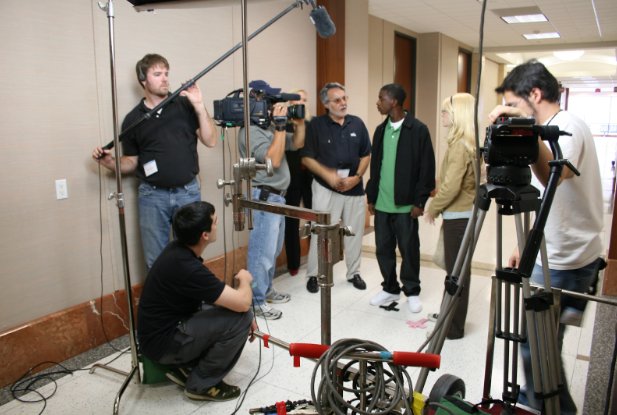The growing popularity of psychological thrillers
Psychological thrillers gain popularity over the years as more movies of the genre are made.
Almost all forms of entertainment fall under a certain genre. Depending on personal taste and preference, viewers tend to favor one over the other. An increasing number of viewers have been lured into the genre of psychological thrillers over the years.
Psychological thrillers are a rather young genre of entertainment. It combines thrillers with psychological fiction to create an alluring form of entertainment that allows viewers to make their own assumptions about the plot and sometimes the outcome of the movie. Due to its suspenseful nature, viewers are often on the edge of their seats throughout movies and shows trying to piece the pieces of the plot together. These movies tend to explore the human psyche as implied by the genre name which adds a level of depth viewers enjoy.
This genre of work is difficult to execute properly and requires in-depth planning and strong ideas. When done correctly, movies that fall under this category can make audiences question their reality and think deeper about the life they live (a lot of weight for a movie to hold).
Psychological thrillers are relatively recent, as they gained popularity in the early 90s. The earliest material of this genre was actually made in 1821 by James Fenimore Cooper’s novel titled The Spy. However, Alfred Hitchcock is often seen as the father of the genre. His work in the early 1990s was what brought the genre to the big screen. One of his most famous works is Vertigo and to this day, many fans of psychological thrillers applaud his great use of characters and calculated camera work.
Directors and creators of this genre tend to take inspiration from psychological theories. Hitchcock, among others, took inspiration mainly from Freud’s framework regarding the human mind.
Memento directed by Christopher Nolan is the embodiment of a typical psychological thriller. The movie has two distinct plotlines, one that takes place at the end of the movie (black and white) and one that takes place at the beginning of the movie (in color). These two plots occur concurrently throughout the film until they line up in an epiphanic moment for the viewers.
The movie follows Leonard Shelby who has the inability to make new memories and is in a constant state of confusion. The audience follows the protagonist and so in turn is equally as confused. As Shelby tries to understand what is occurring, so is the audience. In the end, everything falls into place and the audience begins to understand the cycle Shelby is stuck in; however, he continues to remain in the cycle even after the audience escapes it.
Senior student Melineh Shahverdyan said, “I got into the genre through Memento, it has a way of messing with you which I actually really like.”
Christopher Nolan is often the director that comes to mind when thinking of psychological thrillers. Nolan is seen as a mastermind when it comes to this genre as he uses effective symbolism, psychological theory, and cinematic designs in his films. Some names of his work that may ring a bell include The Dark Knight, Inception, Insomnia, and Interstellar.
In 2019, the movie Parasite by Bong Joon-ho was ranked as the most-awarded movie of the year by the Academy with four wins. This movie falls under the psychological thriller genre and reflects its growing popularity. The movie deals with the disparity between social classes and poverty’s effects on the human psyche.
Psychological thrillers can be done incredibly wrong as well. Losing focus, misuse of symbolism, and inconstant plot, among numerous other miscalculations, can ruin the effectiveness of the genre.
A notable example of this can be seen in Don’t Worry Darling. This movie has had very mixed reviews and is crowded with controversy. Due to its beloved actors, the opinion of viewers is influenced by the cinematic work itself. When looking at the movie objectively, it lacks consistency and a strong message. There were many small details scattered throughout that did not align with its “dramatic twist.”
As with other movies in the genre, the movie attempted to mislead the audience to an inaccurate conclusion, however, it simply did not work. The plot was lacking, not building up characters, having sloppy twists, and frankly, the allure of the movie was lost due to its weak message. Psychological thrillers are driven by their messages, with a weak message the movie was set for failure which appears to be a common theme.
This genre is also only for some. Most viewers watch movies as a way to escape reality and relax. The tense and mysterious nature of these forms of entertainment takes away the “relaxing” aspect of the films. It leaves most viewers confused which leads to frustration.
Eva Sarkisjan is one of the many viewers who prefer to keep their movies light and understandable, “There’s some [psychological thrillers] that I like, it’s just not my cup of tea, I like things that help me relax, not give me an unwarranted existential crisis.”
The pleasure that the audience gets from making predictions, assumptions, and placing clues side by side is the thrilling rush that pulls viewers into the genre. Psychological thrillers are the literature of film, holding symbols and hidden meanings that viewers have to piece together.

Interests/hobbies? Watching movies/shows.
Dream Destination? Everywhere
In 20 years... I'll be 20 years older.
Favorite Fictional Character? Tony...













